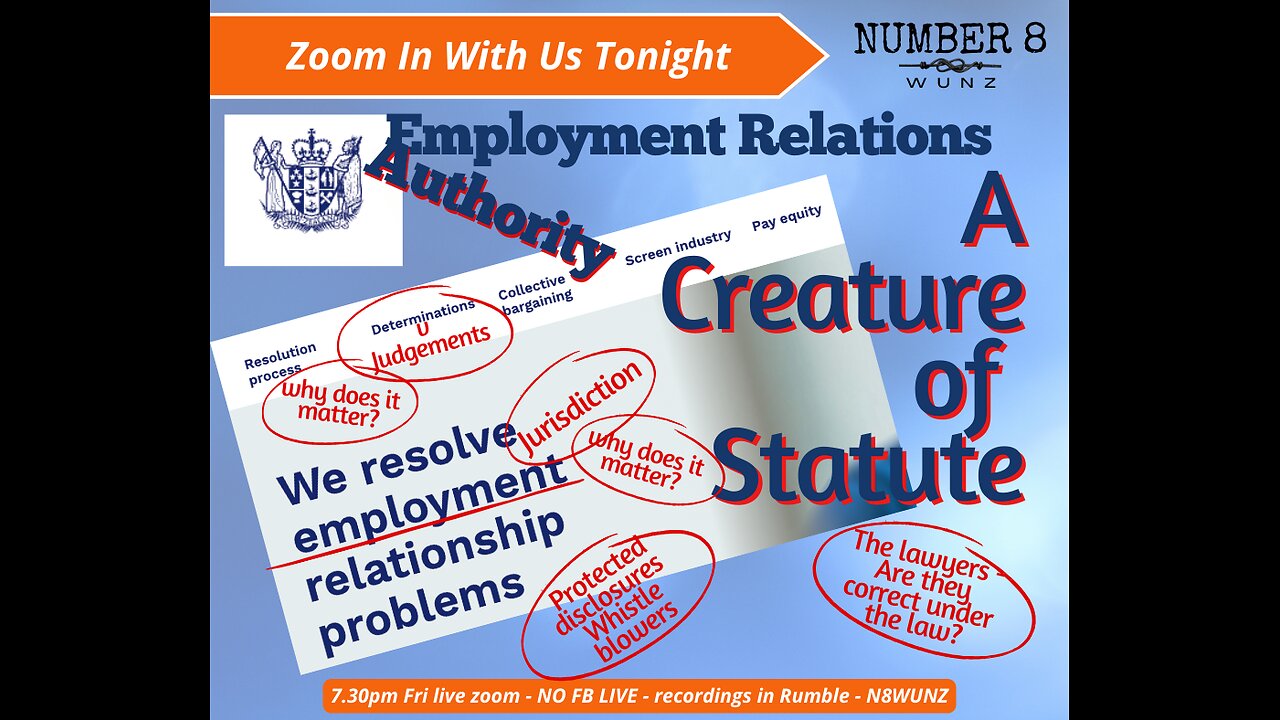Premium Only Content

Ep 116 N8 19th Apr 2024 ERA A Creature of Statute - Inherent Jurisdiction - Ultra Vires
Tonight with Liz - We take a look at the "Inherent Jurisdiction" of the ERA and other courts, how the ERA is a Creature of Statute and is bound by the law, ultra vires, can the ERA order compliance and who by? Is Liz Gunn an employee of Health NZ?
Another fascinating discussion
Here is Liz's notes from Friday night -
Inherent jurisdiction is a doctrine of the English common law that a superior court has the jurisdiction to hear any matter that comes before it, unless a statute or rule limits that authority or grants exclusive jurisdiction to some other court or tribunal. The term is also used when a governmental institution
derives its jurisdiction from a fundamental governing instrument such as a constitution. In the English case of Bremer Vulkan Schiffbau und Maschinenfabrik v. South India Shipping Corporation Ltd, Lord Diplock described the court's inherent jurisdiction as a general power to
control its own procedure so as to prevent its being used to achieve injustice.
Note that in New Zealand the Employment Relations Authority and the Employment Court have exclusive jurisdiction to hear matters relating to employment, functions are divided up between the Court and Authority.
See sections 99, 100, the court and sections 133, 137 applying to the Authority.
[13] It is a truism that the Authority is a creature of statute and that unlike the
High Court, for instance, it possesses no inherent jurisdiction but has only that
jurisdiction which is conferred on it by statute.
[33] If, as the Union contends, the Board has misinterpreted its own functions
(and in particular misinterpreted whatever obligation it might have pursuant to s9(1)(a) of the Racing Act 2003, then the decision to dismiss the second
applicants may be unlawful. The Union notes that the Board is, like the Authority, a creature of statute and not a private employer and it can only do that which it is legally empowered to do. Insofar as it has gone further than the functions set out in its statute, and in particular, in the Union's submission, the function described and contained in s 9(1)(a) of the Racing Act 2003, then it has acted ultra vires its statute and potentially contributed to unjustified dismissals of the second applicants.
137 Power of Authority to order compliance
(1) This section applies where any person has not observed or complied with—
(a)any provision of—
(i)any employment agreement; or
(ii) Parts 1, 3 to 6, 6AB, 6A (except subpart 2), 6B, 6C, 6D, 7, and 9; or
(iii) any terms of settlement or decision that section 151 provides may be enforced by
compliance order; or
(iiia) an enforceable undertaking that section 223C(1) provides may be enforced by compliance order; or
(iiib) an improvement notice that section 223D(6) provides may be enforced by compliance order; or
(iiic) any terms of a pay equity claim settlement under section 13ZH of the Equal Pay Act 1972;
or
(iv) a demand notice that section 225(4) provides may be enforced by compliance order; or
(v) sections 73 and 74 of the Public Service Act 2020 and sections 597 and 600 of the Education and Training Act 2020; or
(vi) sections 76 to 80 of the Public Service Act 2020 and sections 585 to 596 and 660 of the Education and Training Act 2020; or
(vii) section 11(3)(c) of the Health and Disability Services Act 1993; or
(viii) clauses 5 and 6 of Schedule 1 of the Broadcasting Act 1989; or
(ix) sections 83, 83A, and 83B of the Fire Service Act 1975; or
(x) clauses 18, 19, and 21 of Schedule 5 of the Accident Compensation Act 2001; or
(xi) Part 3 and sections 589 and 600 of the Education and Training Act 2020; or
(xi)[Repealed]
(xii)[Repealed]
(b) any order, determination, direction, or requirement made or given under this Act by the Authority or a member or officer of the Authority.
(c) any order, determination, direction, or requirement made or given under the Screen Industry Workers Act 2022 by the Authority or a member or an officer of the Authority.
(2) Where this section applies, the Authority may, in addition to any other power it may exercise, by order require, in or in conjunction with any matter before the Authority under this Act to which that person is a party or in respect of which that person is a witness, that person to do any specified thing or to cease any specified activity, for the purpose of preventing further
non-observance of or non-compliance with that provision, order, determination, direction, or requirement.
(3) The Authority must specify a time within which the order is to be obeyed.
(4) The following persons may take action against another person by applying to the Authority for an order of the kind described in subsection (2):
(a) any person (being an employee, employer, union, or employer organisation) who alleges that that person has been affected by non-observance or non-compliance of the kind described in subsection (1).
-
 1:24:56
1:24:56
Glenn Greenwald
8 hours agoGlenn Takes Your Questions on Tulsi's Russiagate Revelations, Columbia's $200M Settlement, and More | SYSTEM UPDATE #492
116K66 -
 2:11:56
2:11:56
megimu32
5 hours agoOTS: With Great Power: Every Spider-Man Movie Unmasked w/ @thisistheraygaming
21.1K3 -
 2:38:48
2:38:48
WickedVirtue
4 hours agoSailing w/ The Crew
24.1K1 -
 4:29:37
4:29:37
Meisters of Madness
7 hours agoThe Finals with Redd
26.2K1 -
 1:27:11
1:27:11
Omar Elattar
12 hours agoThe Dating Expert: "I've Helped 4,000 Men Find LOVE!" - The #1 Alpha Trait Women Secretly Crave!
51.1K1 -
 LIVE
LIVE
VOPUSARADIO
11 hours agoPOLITI-SHOCK! "END THE FED, END THE LIES & END THE DEEP STATE ONCE AND FOR ALL"!
269 watching -
 1:43:38
1:43:38
LumpyPotatoX2
7 hours agoRumble Creator Round-Table - Let's Talk About It
31.3K2 -
 32:38
32:38
The Mel K Show
10 hours agoMel K & Dr. James Thorp, MD | Sacrifice: The Targeting of the Most Vulnerable | 7-24-25
37.5K13 -
 1:12:41
1:12:41
Donald Trump Jr.
9 hours agoFrom Crypto to AI, There's a New American Energy Revival, Interviews with Asher Genoot & Sen McCormick | TRIGGERED Ep.261
165K61 -
 52:11
52:11
ZeeeMedia
12 hours ago"Meaningful Deep State Prosecution" ft. Robert Barnes | Daily Pulse Ep. 73
43.6K13